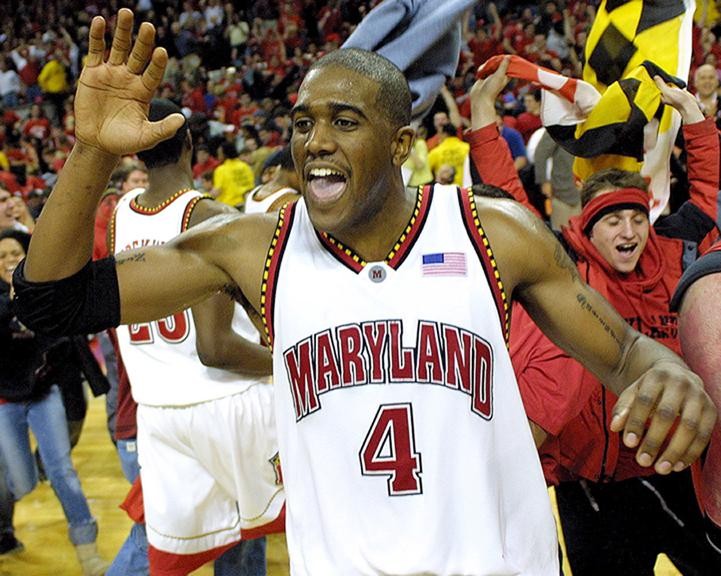
Travis Garrison withdrew from classes in March to pursue a career in professional basketball. Chris McCray and Nik Caner-Medley also withdrew earlier this year with aspirations of living out their NBA dreams. Gary Williams said the players were better off
Gary Williams posed the question. What would you do: Graduate from school within a year or take a chance at fulfilling your childhood dream by taking a job paying $50,000 to $100,000 per year even if you fall short?
Now imagine you only had 10 or 15 years at that job. Ten years to make a living in your field. Imagine taking such a job is what you’ve been training for as long as you could remember. This is what you’re best at.
What would you do?
It wouldn’t take me long to make that decision. I’d be on the first train out of College Park quicker than you can say Sarunas Jasikevicius.
That’s the quandary senior men’s basketball players Nik Caner-Medly, Travis Garrison and Chris McCray faced at the end of their college basketball eligibility. All three made what many people thought of as a selfish, or stupid decisions – to withdraw from this university to begin training for the NBA draft. Caner-Medley withdrew from classes about the end of March, according to Williams.
But I’d argue they made a decision many of us would make ourselves. Unlike many of our careers, which will have escalating salaries until we decide to retire, basketball players have about a 10-year time frame to make some serious dough. They hope to make enough to retire, but many are faced with having to start another life after basketball.
And that’s when they can opt to finish their education. The thing many of us don’t realize is that they are postponing their education, not throwing it away. Some may never come back, but they certainly have that choice.
DECIDING TO LEAVE
After the season’s conclusion, Williams talked with each of his seniors about their future careers. Williams was put in a tough spot because the university wants to make it look as if it is graduating athletes on time, but Williams wants to let his players do what’s best for them.
He sided with his players, telling McCray to leave the parties and distractions of College Park and focus solely on improving his game.
McCray has been working out with former NBA player and head coach John Lucas in Houston, Garrison stayed local to work with Keith Williams and Caner-Medley has been working out in Chicago with Tim Grover.
And while many people may say they could have waited to do that, Garrison and McCray weren’t going to graduate in May anyway. Garrison had at least a full summer load of classes to pass and McCray didn’t even know how many credits short he was but said it would be a couple of summers until graduation.
So with their age only going up and their dreams of playing professionally being potentially postponed for another year, they opted to do everything they could to make those dreams come true. And to do so, they had to train what McCray said is eight hours a day to impress NBA scouts in individual workouts. They’re no longer gawked at and lavished by simply tossing on a jersey. Now, they’re scrapping to get people to pay them attention.
Many NBA teams that have been eliminated from the playoffs begin hosting workouts, and the recent trend has been to put more emphasis on those rather than the four years the player spent in college. In that case, players such as Garrison or McCray, who didn’t have spectacular college careers, have one last shot at making it big.
“If you have talent, it’s just basketball at the end of the day,” McCray said yesterday.
As Williams said, Caner-Medley has the best shot of making the NBA (he is projected as a borderline second-round draft pick), but Garrison and McCray are probably more likely to be heading to Europe, the American Basketball Association, Continental Basketball Association or the NBA Development League.
They certainly have a working model to follow. Former Terp Drew Nicholas is tearing through the Italian Leagues and could be a potential NBA free-agent signing and former Terp Jasikevicius became a star overseas before ending up with the Indiana Pacers.
“Every player has that dream to be an NBA player,” Williams said. “And going to Europe, they think that’s step one to go to the NBA. Sarunas Jasikevicius is the best example. But that doesn’t happen very often. But that postpones the reality of not being able to play anymore.”
For many athletes it’s hard to let the dream die after so many years of pursuit. Basketball is all they know.
“One way or another, I’m going to play basketball somewhere,” Garrison said Wednesday. “I’m very confident. I feel like I’ve been giving it my all.”
SOCIETAL SHIFTS
In the sport where LeBron James is king for many children – many of whom come from areas less well-off than the average university student – college is seen as an avenue to the NBA, not a place of learning.
“The question I used to get in recruiting was, ‘If my son comes to the University of Maryland, can he play basketball and get his degree?” Williams said. “The question becomes now more and more, ‘If my son comes to Maryland, will he have an opportunity to play in the NBA? That’s just the reality.”
That was certainly the case with McCray.
“That’s why I went to the university,” McCray said. “All of Coach Williams’ guys make money somewhere. They put you in a position to make money playing basketball.”
While Garrison’s mother Sheila Garrison said she always pounded “education before athletics” into Travis’ head, there are fewer and fewer of those parents.
“Nowadays you don’t have the same family structure you had 20 years ago,” Williams said. “The push isn’t always there from home like you’d like to see in terms of a player getting his education. So you kind of have to take over that role.”
And even if the parents are preaching the right thing, friends can sometimes be much more persuasive to a young man. There are many other leeches in these players’ lives who try to latch on and put dollar signs in their eyes. They push kids to do anything to make it to the NBA, convincing them it’s their only avenue to success and they’ll help their family in pursuing the fortunes.
“I think the view for players is, ‘How can I make money quicker?'” Williams said. “Do you want to put the building blocks in to ensure success when you’re 40 years old, or do you want to make a lot of money at 21?”
Sheila said there were certainly those kinds of people in Travis’ life, but he knew college was the only way to get to the NBA.
But once athletes get to college, they still focus on improving their game at the expense of their grades. Fans don’t cheer for Garrison to get an A on his next test. They cheer for him to throw down that monster dunk.
HITTING THE BOOKS
Williams said it’s been harder for him to keep his players focused on academics in recent years. When he hears of a problem, he calls them into his Comcast Center office for a meeting and makes them run extra laps. He said he didn’t start a few guys this season because of poor grades.
“If you check back on a couple of those ankle injuries, they may not have been ankle injuries,” Williams said with a grin.
Sometimes Williams calls a player’s parents when he isn’t satisfied with their grades. He said that’s especially effective with parents who are college graduates. And, boy, you don’t want to get the parents coming after you.
Garrison’s mother got on Travis’ case a few times this year and throughout his career.
“He was always saying, ‘Yes, mom. OK, mom.’ He was always that kind of kid,” she said.
Sheila said McCray’s academic dismissal put a little shock into her to stay on top of her son’s academic support. The university and the Athletics Department spends a lot of money to protect their investments. When a player flunks out, that not only means bad press but also, ultimately, a loss of money. When the team does poorly, the money doesn’t roll in quite so smoothly.
Williams took responsibility for McCray’s academic problems in the day’s following the announcement of his guard’s ineligibility, but a coach can’t hold your hand walking to class.
“We have as good an academic situation for the players as anyone,” Williams said. “Now, it’s a two-way street. You can get the best tutors in the world, you can have the best computers and best situation to study. But you have to want to study.”
Most guys, such the average student, don’t have a burning passion to do so. It’s only when they’re about to leave college or out of college when they look back and say, “Crap, I really should have tried harder back then.”
COMING BACK
That’s where Williams comes back into the picture. The coach said he’s had players return asking what they should do next, and he said he always points to the classroom.
Keith Booth, Laron Profit and Terrell Stokes returned to get their degrees. Williams said Nicholas is returning to take classes summer.
While trying not to stomp on their ambitions, Williams stressed to these three seniors to get their degrees just in case basketball doesn’t work out. In fact, he made McCray promise he would.
“I just tell them that in your life, having a degree makes a difference. Whether it’s job-wise or socially, it makes a tremendous difference the rest of your life. When you have kids, you want to say to them that I have my degree and you better get your butt in there and do the same.”
Garrison had to promise as well – to his mother. Sheila said she was at first “a little leery” of Travis’ decision, but eventually came around.
“I told him, ‘You’ve come this far, and you don’t want to give it up now,” Sheila said. “I pushed education when he started high school. I pushed him in college. I’ll push him after college to get more degrees. It’s just that sometimes an opportunity knocks and you have to take it.”
Garrison said he has honest intentions to return to school and finish his criminology and criminal justice degree. He wants to be a mentor to children like him when he graduates – children growing up in a society that stresses making the big bucks over getting an education.
McCray feels he has a good shot at the NBA, and he wants to simply make enough money to be happy for the rest of his life and take care of his family.
When it came to Garrison’s mother, she just wanted Travis to do what made him happy.
Given the chance to say one thing to her son, she said, “No matter what happens in life, strive for perfection. If something doesn’t work out, try something else.”
That’s what these players are doing. For them, perfection is the NBA and professional basketball anywhere else is almost as good. And they’re doing everything, including withdrawing from classes, to get there. If that doesn’t work out, or when their knees start to hurt during warm-ups, that’s when they will have to do something else.
Let’s just hope they keep their word and return to school. After a frustrating end to their careers, these players can still have a sweet ending after all.
Contact columnist Ryan Mink at sports@dbk.umd.edu.



